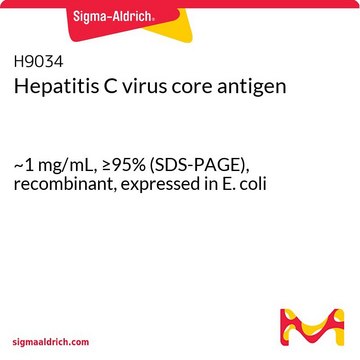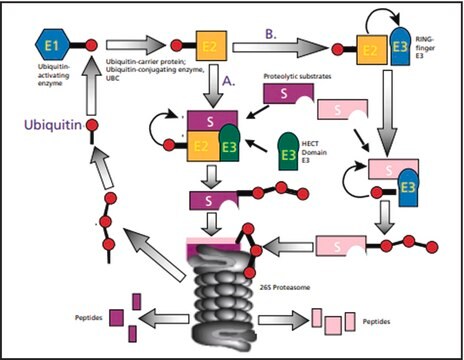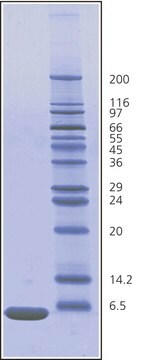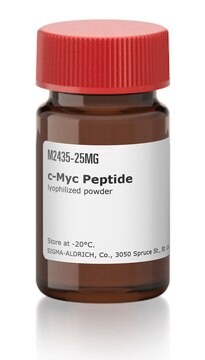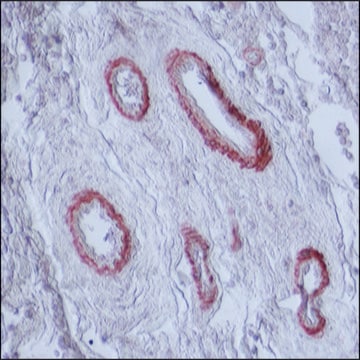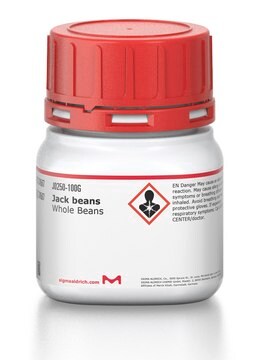14-1121
MultiDsk-Ubiquitin-binding protein reagent
This MultiDsk-Ubiquitin-binding protein reagent is validated for use in Affinity Precipitation Assays for the pull-down of mono- and poly-ubiquitinated proteins.
Synonym(s):
Dsk-Ubiquitin-binding protein reagent, Ubiquitin domain-containing protein DSK2
Sign Into View Organizational & Contract Pricing
All Photos(4)
About This Item
UNSPSC Code:
12352203
eCl@ss:
32160702
NACRES:
NA.41
Recommended Products
General description
MultiDsk - Ubiquitin-binding protein reagent is a GST fusion protein containing an array of five ubiquitin-associated (UBA) domains from the yeast Ub-binding protein Dsk2 (aa 327-373; UniProt P48510). MultiDsk binds and protects ubiquitinated proteins from deubiquitination. When immobilized on glutathione resins, MultiDsk can be used for affinity pull-down of mono- and poly-ubiquitinated proteins from cell extracts and tissue homogenates. This construct also contains a C-terminal 6xHis sequence and an internal 6xHis sequence between the N-terminal GST and the 5XUBA sequence (PMID 23056298). MultiDsk is expressed in and purified from Rosetta (DE3)pLysS strain of E. coli (Cat. No. 70956).
Product Source: Yeast protein, with a GST tag and a His tag, expressed in e. coli.
Specificity
Mono- and poly-ubiquitinated proteins
Immunogen
Epitope: Ubiquitin
This is an protein reagent, not an antibody as it is a yeast protein, with a GST tag and a His tag, expressed in e. coli.
Application
Affinity Precipitation Assay Analysis: A representative lot of MultiDsk-Ubiquitin-binding protein was immobilized on agarose beads and used to precipitate ubiquitinated proteins from yeast and HEK293 whole cell extracts. (Wilson, D.M., et al. (2012) PLoS One. 7(10):e46398).
Affinity Precipitation Assay Analysis: A representative lot of MultiDsk-Ubiquitin-binding protein was immobilized on agarose beads and used to pull down ubiquitinated proteins from yeast whole cell extracts. (Wilson, D.M., et al. (2013) Cell. 154:983-995).
Affinity Precipitation Assay Analysis: A representative lot of MultiDsk-Ubiquitin-binding protein was immobilized on agarose beads and used to pull down ubiquitinated proteins from yeast whole cell extracts. (Wilson, D.M., et al. (2013) Cell. 154:983-995).
Quality
Evaluated by Affinity Precipitation in yeast whole cell extract.
Affinity Precipitation Assay Analysis: Ubiquitinated proteins were isolated from 1.0 mg yeast whole cell extract by MultiDsk-Ubiquitin-binding protein reagent (7.8 ug to 31.3 ug MultiDsk per pull-down) immobilized on agarose beads
Affinity Precipitation Assay Analysis: Ubiquitinated proteins were isolated from 1.0 mg yeast whole cell extract by MultiDsk-Ubiquitin-binding protein reagent (7.8 ug to 31.3 ug MultiDsk per pull-down) immobilized on agarose beads
Physical form
Format: Purified
Purified ubiquitin-binding protein in buffer containing 25mM Tris-HCl pH7.5, 150mM NaCl, 2mM β-mercaptoethanol with 50% glycerol without preservatives.
Storage and Stability
Stable for 1 year at -80°C from date of receipt.
Shipped on Dry Ice. Upon delivery aliquot and store at -80°C. Avoid freeze / thaw cycle
Shipped on Dry Ice. Upon delivery aliquot and store at -80°C. Avoid freeze / thaw cycle
Analysis Note
Multiple bands observed.
Other Notes
Concentration: Please refer to lot specific datasheet.
Storage Class
10 - Combustible liquids
wgk_germany
WGK 2
flash_point_f
Not applicable
flash_point_c
Not applicable
Certificates of Analysis (COA)
Search for Certificates of Analysis (COA) by entering the products Lot/Batch Number. Lot and Batch Numbers can be found on a product’s label following the words ‘Lot’ or ‘Batch’.
Already Own This Product?
Find documentation for the products that you have recently purchased in the Document Library.
MultiDsk: a ubiquitin-specific affinity resin.
Wilson, MD; Saponaro, M; Leidl, MA; Svejstrup, JQ
Testing null
Proteasome-mediated processing of Def1, a critical step in the cellular response to transcription stress.
Wilson, MD; Harreman, M; Taschner, M; Reid, J; Walker, J; Erdjument-Bromage, H; Tempst et al.
Cell null
Our team of scientists has experience in all areas of research including Life Science, Material Science, Chemical Synthesis, Chromatography, Analytical and many others.
Contact Technical Service